Syria: Government Attacking Bread Lines
Civilian Deaths at Bakeries Are War Crimes
Syrian government forces have dropped bombs and fired artillery at or near at least 10 bakeries in Aleppo province over the past three weeks, killing and maiming scores of civilians who were waiting for bread.

The attacks are at least recklessly indiscriminate and the pattern and number of attacks suggest that government forces have been targeting civilians, Human Rights Watch said. Both reckless indiscriminate attacks and deliberately targeting civilians are war crimes.
One attack in the city of Aleppo on August 16, 2012, killed up to 60 people and wounded more than 70. Another attack in the city on August 21 killed at least 23 people and wounded 30.
“Day after day, Aleppo residents line up to get bread for their families, and instead get shrapnel piercing their bodies from government bombs and shells,” said Ole Solvang, emergencies researcher at Human Rights Watch who has just returned from Aleppo. “Ten bakery attacks is not random – they show no care for civilians and strongly indicate an attempt to target them.”
Human Rights Watch researchers visited six of the attacked bakeries and interviewed witnesses:
Bakery in Maare, northern Aleppo, August 22;
Bakery in Al-Bab, northeastern Aleppo, August 21 and 22;
Aqyuol bakery in Bab al-Hadid, Aleppo city, August 21;
Al-Zarra bakery in Qadi Askar, Aleppo city, August 16;
Kanjou bakery, al-Maysar, Aleppo city, August 16;
Bakery in al-Halwaniya, Aleppo city, August 16;
Human Rights Watch collected credible information about four other attacks:
Bakery in Manbij, northern Aleppo, August 24;
Hussein bakery in al-Qaterji, Aleppo city, August 16;
Bakery in Tariq al-Bab, Aleppo city, August 10;
Bakery in al-Sheikh Sa’id district, Aleppo city, August 11.
After weeks of fighting in Aleppo province between government forces and the opposition Free Syrian Army (FSA), acute shortages of flour have forced many bakeries to close. Long lines of civilians regularly wait outside the remaining working bakeries to buy bread.
In all of the cases documented by Human Rights Watch, with the exception of the Manbij bakery attack, government forces attacked the bakery when local residents were waiting in line. The ordnance, which included artillery shells, rockets, and bombs, hit very close to the lines, and pieces of shrapnel sprayed the people gathered, killing and seriously wounding scores of them. In a few cases, people waiting in line ran away before the attack when they heard the approaching fighter jets.
Witnesses to all of the bakery attacks told Human Rights Watch that the government gave no warnings.
The 10 bakeries were in neighborhoods or towns where no fighting was taking place before or during the attack. In most cases, a few FSA fighters were at the bakeries to maintain order and assist with bread distribution, witnesses said, but they were usually not injured.
In one case, a FSA facility was located roughly 150 meters from the bakery, but it was not damaged. In the five other cases investigated by Human Rights Watch, no military targets apart from the few FSA fighters maintaining order were seen in the area.
The presence of some FSA fighters at the bakeries would not make those attacks lawful, given the substantial number of civilians who were present. The government made no apparent attempt to target the small number of fighters or to minimize damage to civilians, Human Rights Watch said. In some cases, a helicopter hovered over the area prior to the attack, so the presence of civilians would have been known.
One of the deadliest attacks was in the Qadi Askar neighborhood in Aleppo city on August 16. Around 5:45 a.m., one or two artillery shells hit the square near one of the FSA bases in the neighborhood, about 150 meters from the bakery. The shell caused no damage to the facility or casualties among FSA members. Fifteen minutes later, three more shells hit the area within a few minutes, successively closer to the bakery, where several hundred people were waiting for bread.
The third shell hit the street a few meters from the bakery, spraying shrapnel into the line of people. The exact number of casualties is difficult to verify, but records viewed by Human Rights Watch at the Dar Al Shifaa hospital, which received most of the wounded and killed from the attack, list 49 identified and 11 unidentified bodies, and 76 injured people.
Source: Human Rights Watch
- 664 reads
Human Rights
Fostering a More Humane World: The 28th Eurasian Economic Summi

Conscience, Hope, and Action: Keys to Global Peace and Sustainability

Ringing FOWPAL’s Peace Bell for the World:Nobel Peace Prize Laureates’ Visions and Actions

Protecting the World’s Cultural Diversity for a Sustainable Future

Puppet Show I International Friendship Day 2020

